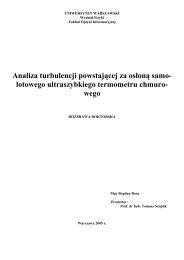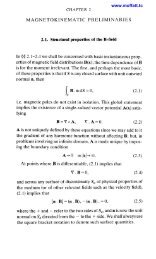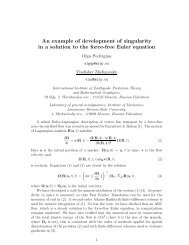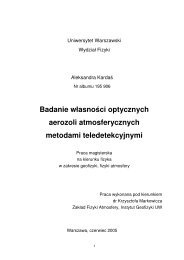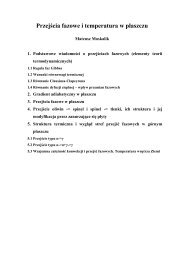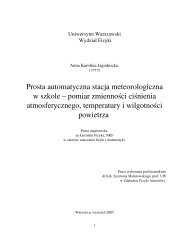GNU Data Language (GDL) a free and open-source implementation ...
GNU Data Language (GDL) a free and open-source implementation ...
GNU Data Language (GDL) a free and open-source implementation ...
You also want an ePaper? Increase the reach of your titles
YUMPU automatically turns print PDFs into web optimized ePapers that Google loves.
<strong>GNU</strong> <strong>Data</strong> <strong>Language</strong> (<strong>GDL</strong>)<br />
a <strong>free</strong> <strong>and</strong> <strong>open</strong>-<strong>source</strong> <strong>implementation</strong> of IDL<br />
Sylwester Arabas<br />
University of Warsaw, Pol<strong>and</strong><br />
Alain Coulais<br />
CNRS LERMA, Observatoire de Paris, France<br />
Takeshi Enomoto<br />
JAMSTEC, Yokohama, Japan<br />
<strong>GDL</strong> development is led by Marc Schellens, the project founder<br />
August 20 th 2010, JAMSTEC, Yokohama, Japan<br />
Sylwester Arabas, Alain Coulais & Takeshi Enomoto <strong>GNU</strong> <strong>Data</strong> <strong>Language</strong> 1/ 34
Plan of the talk<br />
• About <strong>GDL</strong><br />
• what’s <strong>GDL</strong> (<strong>and</strong> IDL)<br />
• why to use <strong>GDL</strong>, who uses it <strong>and</strong> what for<br />
• how to get <strong>GDL</strong><br />
• how to help <strong>and</strong> contribute<br />
• H<strong>and</strong>s-on demo<br />
• running the <strong>GDL</strong> interpreter<br />
• syntax basics<br />
• <strong>open</strong>ing an example dataset<br />
• simple array manipulation<br />
• basic plotting functionalities<br />
Sylwester Arabas, Alain Coulais & Takeshi Enomoto <strong>GNU</strong> <strong>Data</strong> <strong>Language</strong> 2/ 34
efore we begin with <strong>GDL</strong>: what’s IDL<br />
http://www.ittvis.com/<br />
Company Products & Services Academic Events & Training Downloads User Community Support<br />
Register, Login<br />
The IDL Programming <strong>Language</strong><br />
When you need to transform complex scientific data<br />
from numbers into visualizations to convey meaningful<br />
information – such as 2 <strong>and</strong> 3-dimensional lines,<br />
surface <strong>and</strong> contour plots, or high-quality images – you<br />
need a programming language that is intuitive <strong>and</strong><br />
powerful at the same time, <strong>and</strong> one that doesn’t require<br />
excessive time <strong>and</strong> effort to produce expert-level<br />
results.<br />
IDL is the programming language choice of scientists<br />
<strong>and</strong> engineers because it’s easy to learn, easy to use,<br />
<strong>and</strong> requires fewer lines of code than other<br />
programming languages, so getting from data to<br />
discovery is easier <strong>and</strong> faster.<br />
What Makes IDL so Easy <strong>and</strong> Effective?<br />
Dynamic Type System<br />
Intuitive Rules <strong>and</strong> Conventions<br />
Access Virtually any Type of <strong>Data</strong><br />
The IDL programming language requires<br />
fewer lines of code than many other<br />
languages (bottom). Five lines of IDL<br />
code were used to create a contour plot<br />
of coastline topography (top).<br />
[ back ]<br />
Stay Connected<br />
Facebook<br />
Twitter<br />
YouTube<br />
ShareThis<br />
Quick Links<br />
Login to ittvis.com<br />
Contact a Representative<br />
Contact Technical Support<br />
Request Literature<br />
Subscribe<br />
Re<strong>source</strong>s IDL<br />
IDL Home<br />
Recent Releases<br />
Search<br />
Advanced Math & Stats Module<br />
<strong>Data</strong>miner<br />
Information Packet<br />
Watch an IDL Demo<br />
Home | Company Products & Services Academic Events & Training Downloads User Community Support | Site Map<br />
Permissions/Legal © 2010 ITT Visual Information Solutions<br />
• IDL is a product <strong>and</strong> registered<br />
trade mark of ITT Visual<br />
Information Solutions<br />
• IDL is a tool for data analysis<br />
<strong>and</strong> visualisation<br />
• IDL is a programming language<br />
• IDL package contains:<br />
interpreter/compiler, library<br />
routines, documentation <strong>and</strong> a<br />
development environment<br />
• IDL is related with <strong>GDL</strong> as<br />
Matlab with Octave/Scilab,<br />
M$ Office with OO.org etc<br />
Sylwester Arabas, Alain Coulais & Takeshi Enomoto <strong>GNU</strong> <strong>Data</strong> <strong>Language</strong> 3/ 34
IDL in Astronomy<br />
• The situation<br />
• IDL is widely used in astronomy, since 1977,<br />
including a lot of Space Missions (official pipelines)<br />
• Several well known libraries (Astron, MPFIT, Solar Soft, ...)<br />
used as commodity by Scientists<br />
• Code is rather well independant of OS’s (VMS, many Unix, OSX, Linux <strong>and</strong><br />
also MS-win) <strong>and</strong> can live during very long time<br />
• Fast coding, nice for testing idea/modles/processing during data analysis<br />
Sylwester Arabas, Alain Coulais & Takeshi Enomoto <strong>GNU</strong> <strong>Data</strong> <strong>Language</strong> 4/ 34
IDL in Astronomy<br />
• The situation<br />
• IDL is widely used in astronomy, since 1977,<br />
including a lot of Space Missions (official pipelines)<br />
• Several well known libraries (Astron, MPFIT, Solar Soft, ...)<br />
used as commodity by Scientists<br />
• Code is rather well independant of OS’s (VMS, many Unix, OSX, Linux <strong>and</strong><br />
also MS-win) <strong>and</strong> can live during very long time<br />
• Fast coding, nice for testing idea/modles/processing during data analysis<br />
• The problems ?<br />
• Dependence. IDL is not <strong>open</strong> <strong>source</strong> <strong>free</strong> software. We had serious warning in the<br />
past, some platforms (Unix, VMS) had desapear. Despite support by NASA, editor<br />
may desapear. Some choices by editor (widgets, limited graphical outputs, ...) upset<br />
users. Because of the large codebase, we cannot afford disparition!<br />
• No general purpose alternative. Now Python in Astronomy become a real<br />
alternative, but it was not he case 3 or 5 years ago.<br />
Sylwester Arabas, Alain Coulais & Takeshi Enomoto <strong>GNU</strong> <strong>Data</strong> <strong>Language</strong> 4/ 34
IDL in Astronomy<br />
• The situation<br />
• IDL is widely used in astronomy, since 1977,<br />
including a lot of Space Missions (official pipelines)<br />
• Several well known libraries (Astron, MPFIT, Solar Soft, ...)<br />
used as commodity by Scientists<br />
• Code is rather well independant of OS’s (VMS, many Unix, OSX, Linux <strong>and</strong><br />
also MS-win) <strong>and</strong> can live during very long time<br />
• Fast coding, nice for testing idea/modles/processing during data analysis<br />
• The problems ?<br />
• Dependence. IDL is not <strong>open</strong> <strong>source</strong> <strong>free</strong> software. We had serious warning in the<br />
past, some platforms (Unix, VMS) had desapear. Despite support by NASA, editor<br />
may desapear. Some choices by editor (widgets, limited graphical outputs, ...) upset<br />
users. Because of the large codebase, we cannot afford disparition!<br />
• No general purpose alternative. Now Python in Astronomy become a real<br />
alternative, but it was not he case 3 or 5 years ago.<br />
• Solution? Having a <strong>free</strong> clone.<br />
Sylwester Arabas, Alain Coulais & Takeshi Enomoto <strong>GNU</strong> <strong>Data</strong> <strong>Language</strong> 4/ 34
About <strong>GDL</strong>: the project <strong>and</strong> its authors<br />
• aim: develop an <strong>open</strong>-<strong>source</strong> drop-in replacement for IDL<br />
Sylwester Arabas, Alain Coulais & Takeshi Enomoto <strong>GNU</strong> <strong>Data</strong> <strong>Language</strong> 5/ 34
About <strong>GDL</strong>: the project <strong>and</strong> its authors<br />
• aim: develop an <strong>open</strong>-<strong>source</strong> drop-in replacement for IDL<br />
• project founder <strong>and</strong> leader: Marc Schellens<br />
Sylwester Arabas, Alain Coulais & Takeshi Enomoto <strong>GNU</strong> <strong>Data</strong> <strong>Language</strong> 5/ 34
About <strong>GDL</strong>: the project <strong>and</strong> its authors<br />
• aim: develop an <strong>open</strong>-<strong>source</strong> drop-in replacement for IDL<br />
• project founder <strong>and</strong> leader: Marc Schellens<br />
• project team:<br />
• volounteers from around the world including:<br />
Joel Gales, Pierre Chanial, Peter Messmer, . . .<br />
• Alain’s students including:<br />
N. Galmiche, M. Lenoir, G. Marshall, L. Noreskal, T. Mermet<br />
• users sending bug-reports, patches, comments, . . .<br />
• packagers including Takeshi Enomoto from JAMSTEC<br />
Sylwester Arabas, Alain Coulais & Takeshi Enomoto <strong>GNU</strong> <strong>Data</strong> <strong>Language</strong> 5/ 34
About <strong>GDL</strong>: the project <strong>and</strong> its authors<br />
• aim: develop an <strong>open</strong>-<strong>source</strong> drop-in replacement for IDL<br />
• project founder <strong>and</strong> leader: Marc Schellens<br />
• project team:<br />
• volounteers from around the world including:<br />
Joel Gales, Pierre Chanial, Peter Messmer, . . .<br />
• Alain’s students including:<br />
N. Galmiche, M. Lenoir, G. Marshall, L. Noreskal, T. Mermet<br />
• users sending bug-reports, patches, comments, . . .<br />
• packagers including Takeshi Enomoto from JAMSTEC<br />
• current status:<br />
• compiler/interpreter: generally complete<br />
• library routines: partially implemented (ca. 400 routines)<br />
• documentation: virtually nothing (IDL docs are on the web)<br />
• development environment: no plans<br />
Sylwester Arabas, Alain Coulais & Takeshi Enomoto <strong>GNU</strong> <strong>Data</strong> <strong>Language</strong> 5/ 34
About <strong>GDL</strong>: the project <strong>and</strong> its authors<br />
• aim: develop an <strong>open</strong>-<strong>source</strong> drop-in replacement for IDL<br />
• project founder <strong>and</strong> leader: Marc Schellens<br />
• project team:<br />
• volounteers from around the world including:<br />
Joel Gales, Pierre Chanial, Peter Messmer, . . .<br />
• Alain’s students including:<br />
N. Galmiche, M. Lenoir, G. Marshall, L. Noreskal, T. Mermet<br />
• users sending bug-reports, patches, comments, . . .<br />
• packagers including Takeshi Enomoto from JAMSTEC<br />
• current status:<br />
• compiler/interpreter: generally complete<br />
• library routines: partially implemented (ca. 400 routines)<br />
• documentation: virtually nothing (IDL docs are on the web)<br />
• development environment: no plans<br />
• more info: http://gnudatalanguage.<strong>source</strong>forge.net/<br />
Sylwester Arabas, Alain Coulais & Takeshi Enomoto <strong>GNU</strong> <strong>Data</strong> <strong>Language</strong> 5/ 34
Sylwester Arabas, Alain Coulais & Takeshi Enomoto <strong>GNU</strong> <strong>Data</strong> <strong>Language</strong> 6/ 34
About <strong>GDL</strong>: some pros <strong>and</strong> cons<br />
• inherited from IDL:<br />
• one can process data <strong>and</strong> get customized plots of them<br />
with a few (dozens) lines of code<br />
• <strong>open</strong>s many data formats: text, binary, netCDF, HDF, FITS, GRIB. . .<br />
Sylwester Arabas, Alain Coulais & Takeshi Enomoto <strong>GNU</strong> <strong>Data</strong> <strong>Language</strong> 7/ 34
About <strong>GDL</strong>: some pros <strong>and</strong> cons<br />
• inherited from IDL:<br />
• one can process data <strong>and</strong> get customized plots of them<br />
with a few (dozens) lines of code<br />
• <strong>open</strong>s many data formats: text, binary, netCDF, HDF, FITS, GRIB. . .<br />
• <strong>GDL</strong> specific:<br />
• it’s <strong>free</strong>! <strong>and</strong> you can modify <strong>and</strong> exp<strong>and</strong> it to suit your needs<br />
• numerics based on reliable <strong>open</strong>-<strong>source</strong> libraries as (GSL, FFTW, . . . )<br />
• enhanced CLI thanks to readline, SVG & GRIB support, Python bridge<br />
• compiles on many platforms (Linux, BSDs, OSX, Solaris, Cygwin, ...)<br />
Sylwester Arabas, Alain Coulais & Takeshi Enomoto <strong>GNU</strong> <strong>Data</strong> <strong>Language</strong> 7/ 34
About <strong>GDL</strong>: some pros <strong>and</strong> cons<br />
• inherited from IDL:<br />
• one can process data <strong>and</strong> get customized plots of them<br />
with a few (dozens) lines of code<br />
• <strong>open</strong>s many data formats: text, binary, netCDF, HDF, FITS, GRIB. . .<br />
• <strong>GDL</strong> specific:<br />
• it’s <strong>free</strong>! <strong>and</strong> you can modify <strong>and</strong> exp<strong>and</strong> it to suit your needs<br />
• numerics based on reliable <strong>open</strong>-<strong>source</strong> libraries as (GSL, FFTW, . . . )<br />
• enhanced CLI thanks to readline, SVG & GRIB support, Python bridge<br />
• compiles on many platforms (Linux, BSDs, OSX, Solaris, Cygwin, ...)<br />
• inherited from IDL:<br />
• bit archaic syntax with constructs from numerous languages from<br />
Fortran to C++ <strong>and</strong> inconsistent naming of library routines . . .<br />
but who cares, it’s meant to be more a bash than a Java of scientific<br />
computing – it’s intended for short scripts <strong>and</strong> interactive usage<br />
Sylwester Arabas, Alain Coulais & Takeshi Enomoto <strong>GNU</strong> <strong>Data</strong> <strong>Language</strong> 7/ 34
About <strong>GDL</strong>: some pros <strong>and</strong> cons<br />
• inherited from IDL:<br />
• one can process data <strong>and</strong> get customized plots of them<br />
with a few (dozens) lines of code<br />
• <strong>open</strong>s many data formats: text, binary, netCDF, HDF, FITS, GRIB. . .<br />
• <strong>GDL</strong> specific:<br />
• it’s <strong>free</strong>! <strong>and</strong> you can modify <strong>and</strong> exp<strong>and</strong> it to suit your needs<br />
• numerics based on reliable <strong>open</strong>-<strong>source</strong> libraries as (GSL, FFTW, . . . )<br />
• enhanced CLI thanks to readline, SVG & GRIB support, Python bridge<br />
• compiles on many platforms (Linux, BSDs, OSX, Solaris, Cygwin, ...)<br />
• inherited from IDL:<br />
• bit archaic syntax with constructs from numerous languages from<br />
Fortran to C++ <strong>and</strong> inconsistent naming of library routines . . .<br />
but who cares, it’s meant to be more a bash than a Java of scientific<br />
computing – it’s intended for short scripts <strong>and</strong> interactive usage<br />
• <strong>GDL</strong> specific:<br />
• not all library routines are implemented yet<br />
• some useful keywords are missing<br />
• lack of documentation (but IDL docs are on the web)<br />
Sylwester Arabas, Alain Coulais & Takeshi Enomoto <strong>GNU</strong> <strong>Data</strong> <strong>Language</strong> 7/ 34
About <strong>GDL</strong>: known users<br />
• people at the Paris Observatory, Lyon Observatory,<br />
Strasbourg Observatory<br />
...?<br />
Sylwester Arabas, Alain Coulais & Takeshi Enomoto <strong>GNU</strong> <strong>Data</strong> <strong>Language</strong> 8/ 34
About <strong>GDL</strong>: known users<br />
• people at the Paris Observatory, Lyon Observatory,<br />
Strasbourg Observatory<br />
• people at NASA (GSFC, JPL, . . . ) <strong>and</strong> MIT<br />
...?<br />
Sylwester Arabas, Alain Coulais & Takeshi Enomoto <strong>GNU</strong> <strong>Data</strong> <strong>Language</strong> 8/ 34
About <strong>GDL</strong>: known users<br />
• people at the Paris Observatory, Lyon Observatory,<br />
Strasbourg Observatory<br />
• people at NASA (GSFC, JPL, . . . ) <strong>and</strong> MIT<br />
• people in Max Planck’s labs<br />
...?<br />
Sylwester Arabas, Alain Coulais & Takeshi Enomoto <strong>GNU</strong> <strong>Data</strong> <strong>Language</strong> 8/ 34
About <strong>GDL</strong>: known users<br />
• people at the Paris Observatory, Lyon Observatory,<br />
Strasbourg Observatory<br />
• people at NASA (GSFC, JPL, . . . ) <strong>and</strong> MIT<br />
• people in Max Planck’s labs<br />
• people at the Lockheed Martin Solar <strong>and</strong> Astrophysics<br />
Laboratory <strong>and</strong> Stanford University (2 conf. papers on <strong>GDL</strong>)<br />
...?<br />
Sylwester Arabas, Alain Coulais & Takeshi Enomoto <strong>GNU</strong> <strong>Data</strong> <strong>Language</strong> 8/ 34
About <strong>GDL</strong>: known users<br />
• people at the Paris Observatory, Lyon Observatory,<br />
Strasbourg Observatory<br />
• people at NASA (GSFC, JPL, . . . ) <strong>and</strong> MIT<br />
• people in Max Planck’s labs<br />
• people at the Lockheed Martin Solar <strong>and</strong> Astrophysics<br />
Laboratory <strong>and</strong> Stanford University (2 conf. papers on <strong>GDL</strong>)<br />
• contacts in Australia, Brazil, India, Israel, Japan, Spain,<br />
Switzerl<strong>and</strong>, UK, USA, Venezuela... (astro- <strong>and</strong> geophysicists)<br />
...?<br />
Sylwester Arabas, Alain Coulais & Takeshi Enomoto <strong>GNU</strong> <strong>Data</strong> <strong>Language</strong> 8/ 34
About <strong>GDL</strong>: known users<br />
• people at the Paris Observatory, Lyon Observatory,<br />
Strasbourg Observatory<br />
• people at NASA (GSFC, JPL, . . . ) <strong>and</strong> MIT<br />
• people in Max Planck’s labs<br />
• people at the Lockheed Martin Solar <strong>and</strong> Astrophysics<br />
Laboratory <strong>and</strong> Stanford University (2 conf. papers on <strong>GDL</strong>)<br />
• contacts in Australia, Brazil, India, Israel, Japan, Spain,<br />
Switzerl<strong>and</strong>, UK, USA, Venezuela... (astro- <strong>and</strong> geophysicists)<br />
• some guys in the medical imaging comunity<br />
(the <strong>GDL</strong>ffDICOM package)<br />
...?<br />
Sylwester Arabas, Alain Coulais & Takeshi Enomoto <strong>GNU</strong> <strong>Data</strong> <strong>Language</strong> 8/ 34
About <strong>GDL</strong>: known users<br />
• people at the Paris Observatory, Lyon Observatory,<br />
Strasbourg Observatory<br />
• people at NASA (GSFC, JPL, . . . ) <strong>and</strong> MIT<br />
• people in Max Planck’s labs<br />
• people at the Lockheed Martin Solar <strong>and</strong> Astrophysics<br />
Laboratory <strong>and</strong> Stanford University (2 conf. papers on <strong>GDL</strong>)<br />
• contacts in Australia, Brazil, India, Israel, Japan, Spain,<br />
Switzerl<strong>and</strong>, UK, USA, Venezuela... (astro- <strong>and</strong> geophysicists)<br />
• some guys in the medical imaging comunity<br />
(the <strong>GDL</strong>ffDICOM package)<br />
• Sylwester’s students at the University of Warsaw<br />
...?<br />
Sylwester Arabas, Alain Coulais & Takeshi Enomoto <strong>GNU</strong> <strong>Data</strong> <strong>Language</strong> 8/ 34
About <strong>GDL</strong>: known users<br />
...?<br />
• people at the Paris Observatory, Lyon Observatory,<br />
Strasbourg Observatory<br />
• people at NASA (GSFC, JPL, . . . ) <strong>and</strong> MIT<br />
• people in Max Planck’s labs<br />
• people at the Lockheed Martin Solar <strong>and</strong> Astrophysics<br />
Laboratory <strong>and</strong> Stanford University (2 conf. papers on <strong>GDL</strong>)<br />
• contacts in Australia, Brazil, India, Israel, Japan, Spain,<br />
Switzerl<strong>and</strong>, UK, USA, Venezuela... (astro- <strong>and</strong> geophysicists)<br />
• some guys in the medical imaging comunity<br />
(the <strong>GDL</strong>ffDICOM package)<br />
• Sylwester’s students at the University of Warsaw<br />
• students at the Dept of Physics, Montana State Univ.<br />
Sylwester Arabas, Alain Coulais & Takeshi Enomoto <strong>GNU</strong> <strong>Data</strong> <strong>Language</strong> 8/ 34
About <strong>GDL</strong>: known users<br />
...?<br />
• people at the Paris Observatory, Lyon Observatory,<br />
Strasbourg Observatory<br />
• people at NASA (GSFC, JPL, . . . ) <strong>and</strong> MIT<br />
• people in Max Planck’s labs<br />
• people at the Lockheed Martin Solar <strong>and</strong> Astrophysics<br />
Laboratory <strong>and</strong> Stanford University (2 conf. papers on <strong>GDL</strong>)<br />
• contacts in Australia, Brazil, India, Israel, Japan, Spain,<br />
Switzerl<strong>and</strong>, UK, USA, Venezuela... (astro- <strong>and</strong> geophysicists)<br />
• some guys in the medical imaging comunity<br />
(the <strong>GDL</strong>ffDICOM package)<br />
• Sylwester’s students at the University of Warsaw<br />
• students at the Dept of Physics, Montana State Univ.<br />
• <strong>and</strong> many more... (assuming from the number of downloads,<br />
packages, forum posts)<br />
Sylwester Arabas, Alain Coulais & Takeshi Enomoto <strong>GNU</strong> <strong>Data</strong> <strong>Language</strong> 8/ 34
About <strong>GDL</strong>: how we use it<br />
• @ the Observatoire de Paris:<br />
• analysing time series (several satelittes)<br />
• modelization <strong>and</strong> inversion of time responses of various detectors:<br />
IR detectors, bolometers<br />
• 2D deconvolution methods for Radio Interferometry<br />
(Clean, MEM, <strong>and</strong> alternative)<br />
• teaching various topics, at different levels: FFT, image processing ...<br />
Sylwester Arabas, Alain Coulais & Takeshi Enomoto <strong>GNU</strong> <strong>Data</strong> <strong>Language</strong> 9/ 34
About <strong>GDL</strong>: how we use it<br />
• @ the Observatoire de Paris:<br />
• analysing time series (several satelittes)<br />
• modelization <strong>and</strong> inversion of time responses of various detectors:<br />
IR detectors, bolometers<br />
• 2D deconvolution methods for Radio Interferometry<br />
(Clean, MEM, <strong>and</strong> alternative)<br />
• teaching various topics, at different levels: FFT, image processing ...<br />
• @ the University of Warsaw:<br />
• aircraft & LIDAR measurements data analysis <strong>and</strong> visualisation<br />
• teaching meteorological data processing:<br />
• geosci. model ouptut data: interpolation, subsetting, statistics<br />
• signals processing: FFT, wavelets, principal components, filtering<br />
• satellite image <strong>and</strong> weather-forecast display/processing<br />
• plotting, data formats: CVS, netCDF, HDF4, HDF5, GRIB<br />
• ”operational” weather forecast visualisation (GRIB+SVG)<br />
Sylwester Arabas, Alain Coulais & Takeshi Enomoto <strong>GNU</strong> <strong>Data</strong> <strong>Language</strong> 9/ 34
About <strong>GDL</strong>: how others use it<br />
• At Strasbourg <strong>and</strong> Lyon:<br />
doing heavy computations without blocking IDL licences<br />
(<strong>GDL</strong> cited in an MNRAS article!)<br />
Sylwester Arabas, Alain Coulais & Takeshi Enomoto <strong>GNU</strong> <strong>Data</strong> <strong>Language</strong> 10/ 34
About <strong>GDL</strong>: how others use it<br />
• At Strasbourg <strong>and</strong> Lyon:<br />
doing heavy computations without blocking IDL licences<br />
(<strong>GDL</strong> cited in an MNRAS article!)<br />
• at LESIA, Paris Obs.:<br />
substituting IDL by <strong>GDL</strong> in an automatic pipeline from a<br />
given format (PDS used in Planetary mission) to a new one<br />
(Virtual Observatory, XML ...). Gaining perenity on very long<br />
time scale (space missions: 10 to 30 years).<br />
Sylwester Arabas, Alain Coulais & Takeshi Enomoto <strong>GNU</strong> <strong>Data</strong> <strong>Language</strong> 10/ 34
About <strong>GDL</strong>: how others use it<br />
• At Strasbourg <strong>and</strong> Lyon:<br />
doing heavy computations without blocking IDL licences<br />
(<strong>GDL</strong> cited in an MNRAS article!)<br />
• at LESIA, Paris Obs.:<br />
substituting IDL by <strong>GDL</strong> in an automatic pipeline from a<br />
given format (PDS used in Planetary mission) to a new one<br />
(Virtual Observatory, XML ...). Gaining perenity on very long<br />
time scale (space missions: 10 to 30 years).<br />
• at Lockheed Martin/Stanford:<br />
deconvolution of images from solar telescopes using<br />
a CUDA-enhanced <strong>GDL</strong> (poster at NVIDIA conference!)<br />
Sylwester Arabas, Alain Coulais & Takeshi Enomoto <strong>GNU</strong> <strong>Data</strong> <strong>Language</strong> 10/ 34
About <strong>GDL</strong>: how others use it<br />
• At Strasbourg <strong>and</strong> Lyon:<br />
doing heavy computations without blocking IDL licences<br />
(<strong>GDL</strong> cited in an MNRAS article!)<br />
• at LESIA, Paris Obs.:<br />
substituting IDL by <strong>GDL</strong> in an automatic pipeline from a<br />
given format (PDS used in Planetary mission) to a new one<br />
(Virtual Observatory, XML ...). Gaining perenity on very long<br />
time scale (space missions: 10 to 30 years).<br />
• at Lockheed Martin/Stanford:<br />
deconvolution of images from solar telescopes using<br />
a CUDA-enhanced <strong>GDL</strong> (poster at NVIDIA conference!)<br />
• at Montana State University:<br />
web-based remote access to data analysis environment for<br />
students of an IDL course<br />
Sylwester Arabas, Alain Coulais & Takeshi Enomoto <strong>GNU</strong> <strong>Data</strong> <strong>Language</strong> 10/ 34
<strong>GDL</strong> - <strong>GNU</strong> <strong>Data</strong> <strong>Language</strong> Beta by m_schellens<br />
Summary Files Support Develop Tracker Mailing Lists Forums Code<br />
<strong>GDL</strong> - <strong>GNU</strong> <strong>Data</strong> <strong>Language</strong>, a <strong>free</strong> IDL (Interactive <strong>Data</strong> <strong>Language</strong>, see http://ittvis.com/idl/) compatible<br />
incremental compiler.<br />
Download Now!<br />
gdl-0.9rc4.tar.gz (1.5 MB)<br />
OR<br />
View all files<br />
Project Reviews<br />
That's a very good work.<br />
posted by astroste 313 days ago<br />
Was this review helpful for you? Yes or No<br />
An incomplete but functional <strong>and</strong> very useful Interactive <strong>Data</strong> <strong>Language</strong> interpreter.<br />
posted by anonymous 359 days ago<br />
Was this review helpful for you? Yes or No<br />
Extremely useful!<br />
posted by anonymous 288 days ago<br />
Was this review helpful for you? Yes or No<br />
High funcionality!<br />
posted by anonymous 134 days ago<br />
Was this review helpful for you? Yes or No<br />
<strong>GDL</strong> is a great chance to introduce IDL to students. Thanks to all developers!<br />
posted by anonymous 197 days ago<br />
Was this review helpful for you? Yes or No<br />
Bit of a pain to compile, but generally works well <strong>and</strong> makes it quick <strong>and</strong> easy to do sophisticated<br />
data analysis.<br />
posted by anonymous 244 days ago<br />
Was this review helpful for you? Yes or No<br />
Sylwester Arabas, Alain Coulais & Takeshi Enomoto <strong>GNU</strong> <strong>Data</strong> <strong>Language</strong> 11/ 34
Sylwester Arabas, Alain Coulais & Takeshi Enomoto <strong>GNU</strong> <strong>Data</strong> <strong>Language</strong> 12/ 34
Sylwester Arabas, Alain Coulais & Takeshi Enomoto <strong>GNU</strong> <strong>Data</strong> <strong>Language</strong> 13/ 34
Sylwester Arabas, Alain Coulais & Takeshi Enomoto <strong>GNU</strong> <strong>Data</strong> <strong>Language</strong> 14/ 34
Sylwester Arabas, Alain Coulais & Takeshi Enomoto <strong>GNU</strong> <strong>Data</strong> <strong>Language</strong> 15/ 34
Sylwester Arabas, Alain Coulais & Takeshi Enomoto <strong>GNU</strong> <strong>Data</strong> <strong>Language</strong> 16/ 34
Sylwester Arabas, Alain Coulais & Takeshi Enomoto <strong>GNU</strong> <strong>Data</strong> <strong>Language</strong> 17/ 34
Sylwester Arabas, Alain Coulais & Takeshi Enomoto <strong>GNU</strong> <strong>Data</strong> <strong>Language</strong> 18/ 34
Sylwester Arabas, Alain Coulais & Takeshi Enomoto <strong>GNU</strong> <strong>Data</strong> <strong>Language</strong> 19/ 34
Sylwester Arabas, Alain Coulais & Takeshi Enomoto <strong>GNU</strong> <strong>Data</strong> <strong>Language</strong> 20/ 34
Sylwester Arabas, Alain Coulais & Takeshi Enomoto <strong>GNU</strong> <strong>Data</strong> <strong>Language</strong> 21/ 34
Sylwester Arabas, Alain Coulais & Takeshi Enomoto <strong>GNU</strong> <strong>Data</strong> <strong>Language</strong> 22/ 34
About <strong>GDL</strong>: how to get <strong>GDL</strong><br />
• pre-compiled packages (no trouble, fast, no options, releases only):<br />
• Fedora: 32/64 bit, up-to-date, even experimental features available<br />
• Debian: ca. 15 architectures!, bit outdated (2009-09)<br />
• ArchLinux: up-to-date, small feature set<br />
• Ubuntu: obsolete (2008-04)<br />
• unofficial up-to-date packages for Ubuntu & Debian by Lea Noreskal<br />
• HMUG (OSX): up-to-date<br />
• hpc.<strong>source</strong>forge.net: obsolete (2008-04)<br />
Sylwester Arabas, Alain Coulais & Takeshi Enomoto <strong>GNU</strong> <strong>Data</strong> <strong>Language</strong> 23/ 34
About <strong>GDL</strong>: how to get <strong>GDL</strong><br />
• pre-compiled packages (no trouble, fast, no options, releases only):<br />
• Fedora: 32/64 bit, up-to-date, even experimental features available<br />
• Debian: ca. 15 architectures!, bit outdated (2009-09)<br />
• ArchLinux: up-to-date, small feature set<br />
• Ubuntu: obsolete (2008-04)<br />
• unofficial up-to-date packages for Ubuntu & Debian by Lea Noreskal<br />
• HMUG (OSX): up-to-date<br />
• hpc.<strong>source</strong>forge.net: obsolete (2008-04)<br />
• pre-configured packages (no trouble, some options, releases only):<br />
• Gentoo: up-to-date, rich feature set<br />
• Macports: up-to-date, rich feature set (the only one with CMSVLIB!)<br />
• Fink: up-to-date<br />
• FreeBSD: bit outdated (2009-09)<br />
Sylwester Arabas, Alain Coulais & Takeshi Enomoto <strong>GNU</strong> <strong>Data</strong> <strong>Language</strong> 23/ 34
About <strong>GDL</strong>: how to get <strong>GDL</strong><br />
• pre-compiled packages (no trouble, fast, no options, releases only):<br />
• Fedora: 32/64 bit, up-to-date, even experimental features available<br />
• Debian: ca. 15 architectures!, bit outdated (2009-09)<br />
• ArchLinux: up-to-date, small feature set<br />
• Ubuntu: obsolete (2008-04)<br />
• unofficial up-to-date packages for Ubuntu & Debian by Lea Noreskal<br />
• HMUG (OSX): up-to-date<br />
• hpc.<strong>source</strong>forge.net: obsolete (2008-04)<br />
• pre-configured packages (no trouble, some options, releases only):<br />
• Gentoo: up-to-date, rich feature set<br />
• Macports: up-to-date, rich feature set (the only one with CMSVLIB!)<br />
• Fink: up-to-date<br />
• FreeBSD: bit outdated (2009-09)<br />
• <strong>source</strong> distribution (all options up to you, troubles happen, releases only)<br />
Sylwester Arabas, Alain Coulais & Takeshi Enomoto <strong>GNU</strong> <strong>Data</strong> <strong>Language</strong> 23/ 34
About <strong>GDL</strong>: how to get <strong>GDL</strong><br />
• pre-compiled packages (no trouble, fast, no options, releases only):<br />
• Fedora: 32/64 bit, up-to-date, even experimental features available<br />
• Debian: ca. 15 architectures!, bit outdated (2009-09)<br />
• ArchLinux: up-to-date, small feature set<br />
• Ubuntu: obsolete (2008-04)<br />
• unofficial up-to-date packages for Ubuntu & Debian by Lea Noreskal<br />
• HMUG (OSX): up-to-date<br />
• hpc.<strong>source</strong>forge.net: obsolete (2008-04)<br />
• pre-configured packages (no trouble, some options, releases only):<br />
• Gentoo: up-to-date, rich feature set<br />
• Macports: up-to-date, rich feature set (the only one with CMSVLIB!)<br />
• Fink: up-to-date<br />
• FreeBSD: bit outdated (2009-09)<br />
• <strong>source</strong> distribution (all options up to you, troubles happen, releases only)<br />
• CVS (all options up to you, newest features/fixes, expect troubles)<br />
Sylwester Arabas, Alain Coulais & Takeshi Enomoto <strong>GNU</strong> <strong>Data</strong> <strong>Language</strong> 23/ 34
About <strong>GDL</strong>: the Macports <strong>GDL</strong> package<br />
eyrie:~ slayoo$ port info gnudatalanguage<br />
gnudatalanguage @0.9rc4, Revision 4 (math, science)<br />
Variants:<br />
mpich, <strong>open</strong>mp, python, universal, wxWidgets<br />
Description:<br />
Homepage:<br />
A <strong>free</strong> IDL (Interactive <strong>Data</strong> <strong>Language</strong>) compatible<br />
incremental compiler (ie. runs IDL programs).<br />
http://gnudatalanguage.<strong>source</strong>forge.net/<br />
Build Dependencies: autoconf, automake, libtool<br />
Library Dependencies: zlib, gsl, ncurses, readline, plplot, netcdf, hdf4,<br />
hdf5-18, grib_api, libproj4, ImageMagick, xorg-libX11,<br />
udunits2, fftw-3, fftw-3-single, cmsvlib<br />
Platforms:<br />
darwin<br />
License:<br />
GPLv2<br />
Maintainers:<br />
takeshi@macports.org, slayoo@igf.fuw.edu.pl<br />
http://www.macports.org/<br />
Sylwester Arabas, Alain Coulais & Takeshi Enomoto <strong>GNU</strong> <strong>Data</strong> <strong>Language</strong> 24/ 34
About <strong>GDL</strong>: how to help <strong>and</strong> contribute<br />
• Try it! Let us know what you use <strong>GDL</strong> for. Or if you don’t, why not.<br />
• Report feature/improvement requests <strong>and</strong> bugs (with example codes).<br />
• Send patches (GPL code) with new features, bugfixes or test routines.<br />
• Port or package <strong>GDL</strong> for new platforms.<br />
• Report problems to packagers.<br />
• Let others know about <strong>GDL</strong>!<br />
We need help!<br />
Sylwester Arabas, Alain Coulais & Takeshi Enomoto <strong>GNU</strong> <strong>Data</strong> <strong>Language</strong> 25/ 34
About <strong>GDL</strong>: how to help <strong>and</strong> contribute<br />
• Try it! Let us know what you use <strong>GDL</strong> for. Or if you don’t, why not.<br />
• Report feature/improvement requests <strong>and</strong> bugs (with example codes).<br />
• Send patches (GPL code) with new features, bugfixes or test routines.<br />
• Port or package <strong>GDL</strong> for new platforms.<br />
• Report problems to packagers.<br />
• Let others know about <strong>GDL</strong>!<br />
We need help!<br />
• What is really important now is that <strong>GDL</strong> is User-wish driven project.<br />
• We cannot check all the cases: please report!<br />
• We don’t know all keywords: please report if missing or misbehaving.<br />
• We don’t know or haven’t checked all (sometime crazy) interactions<br />
between keywords: please report problems (IDL Documentation is itself<br />
not always without ambiguities).<br />
Sylwester Arabas, Alain Coulais & Takeshi Enomoto <strong>GNU</strong> <strong>Data</strong> <strong>Language</strong> 25/ 34
H<strong>and</strong>s-on: let’s start<br />
$ gdl<br />
<strong>GDL</strong>> print, ’Hello world!’<br />
Hello world!<br />
<strong>GDL</strong>> $ echo ”Hello world!”<br />
Hello world!<br />
<strong>GDL</strong>> hello<br />
% Compiled module: HELLO.<br />
Hello world!<br />
<strong>GDL</strong>> hello<br />
Hello world!<br />
<strong>GDL</strong>> exit<br />
$ gdl -quiet -e hello<br />
% Compiled module: HELLO.<br />
Hello world!<br />
hello.pro:<br />
1 pro hello<br />
2 print, 'Hello world!'<br />
3 end<br />
Sylwester Arabas, Alain Coulais & Takeshi Enomoto <strong>GNU</strong> <strong>Data</strong> <strong>Language</strong> 26/ 34
H<strong>and</strong>s-on: syntax basics<br />
• assignement & function call with one positional argument:<br />
<strong>GDL</strong>> a = findgen(11)<br />
• procedure call & variable size inquiry<br />
<strong>GDL</strong>> help, a<br />
• keyword argument & some Fortran heritage...<br />
<strong>GDL</strong>> print, a, format=’(4G)’<br />
• ... <strong>and</strong> some relief for C users<br />
<strong>GDL</strong>> print, a, format=’(%”%4.3g”)’<br />
• simplest plot (x-axis: array indices) & math ops. applied to arrays<br />
<strong>GDL</strong>> plot, sin(a*!PI/10)ˆ 2<br />
• array adressing<br />
<strong>GDL</strong>> print, a[0]<br />
<strong>GDL</strong>> print, a[4:5]<br />
<strong>GDL</strong>> print, a[[9,10]]<br />
<strong>GDL</strong>> print, a[a]<br />
<strong>GDL</strong>> print, a[indgen(3)]<br />
Sylwester Arabas, Alain Coulais & Takeshi Enomoto <strong>GNU</strong> <strong>Data</strong> <strong>Language</strong> 27/ 34
H<strong>and</strong>s-on: CReSS-SDM example<br />
1 pro cressanim, ncfile<br />
2 nc = ncdf_<strong>open</strong>(ncfile) ; <strong>open</strong>ing the netCDF file<br />
3 ncdf_varget, nc, 'X', x & nx = n_elements(x) ; \<br />
4 ncdf_varget, nc, 'Z', z & nz = n_elements(z) ; | grid-box->x/z ; time-step->time<br />
5 ncdf_varget, nc, 'T', t & nt = n_elements(t) ; /<br />
6<br />
7 loadct, 1 ; BLUE/WHITE colour palette<br />
8 qclev = findgen(11) / 1000. ; [0, .001, ... .01] kg/kg<br />
9<br />
10 for i = 0, nt - 1 do begin<br />
11 ncdf_varget, nc, 'qc', qc, offset=[0,0,0,i], count=[nx,1,nz,1]<br />
12 contour, reform(qc), x, z, /fill, levels=qclev, title=t[i] ; filled-contour plots of cloud water<br />
13<br />
14 ncdf_varget, nc, 'qr', qr, o=[0,0,0,i], c=[nx,1,nz,1] ; any unambiguous keyword name is OK<br />
15 wh = where(qr gt 0, cnt) ; returns "1d indices"<br />
16 if cnt gt 0 then begin<br />
17 ai = array_indices(qr, wh) ; converting indices from 1d to 2d<br />
18 plots, x[ai[0,*]], z[ai[2,*]], psym=7 ; rain water plotted with "X" symbols<br />
19 endif<br />
20<br />
21 wait, 1 ; wating one seconds before next frame<br />
22 endfor<br />
23 end<br />
Sylwester Arabas, Alain Coulais & Takeshi Enomoto <strong>GNU</strong> <strong>Data</strong> <strong>Language</strong> 28/ 34
Sylwester Arabas, Alain Coulais & Takeshi Enomoto <strong>GNU</strong> <strong>Data</strong> <strong>Language</strong> 29/ 34
NCDF OPEN & NCDF VARGET<br />
NCDF OPEN() <strong>open</strong>s a netCDF file<br />
returns: a ”h<strong>and</strong>le” to the file (long integer)<br />
arguments: filename<br />
keywords: /nowrite, /write<br />
NCDF VARGET retrieves data from an <strong>open</strong> netCDF file<br />
arguments: h<strong>and</strong>le, variable id or name, output variable<br />
keywords: count=array, offset=array, stride=array<br />
Sylwester Arabas, Alain Coulais & Takeshi Enomoto <strong>GNU</strong> <strong>Data</strong> <strong>Language</strong> 30/ 34
LOADCT, CONTOUR & PLOTS<br />
LOADCT loads a color palette<br />
argument: palette id (0. . . 40)<br />
CONTOUR plots data with contours<br />
arguments: values array, [x array, y array]<br />
keywords: /fill, levels=array, title=string, ...<br />
PLOTS plots data with symbols or lines<br />
arguments: x array, y array<br />
keywords: psym=integer, ...<br />
Sylwester Arabas, Alain Coulais & Takeshi Enomoto <strong>GNU</strong> <strong>Data</strong> <strong>Language</strong> 31/ 34
WHERE, ARRAY INDICES & REFORM<br />
WHERE() returns the (1d) indices of array elems that evaluate to true<br />
arguments: array, output var with count of ”true” elems<br />
keywords: . . .<br />
ARRAY INDICES() converts 1-d indices to n-d indices<br />
returns: array with n-d indices for given 1-d indices<br />
arguments: n-d array, 1-d indices<br />
keywords: . . .<br />
REFORM() changes the dimensions of an array<br />
returns: the modified array (copy or not)<br />
arguments: array, [new dimenions]<br />
keywords: /overwrite<br />
Sylwester Arabas, Alain Coulais & Takeshi Enomoto <strong>GNU</strong> <strong>Data</strong> <strong>Language</strong> 32/ 34
.COMPILE, STOP & .CONTINUE<br />
.COMPILE triggers recompilation of a file/routine<br />
(interpreter directive)<br />
STOP stops execution allowing interactive debuging<br />
(to be inserted in the code)<br />
.CONTINUE continues execution after a STOP<br />
(interpreter directive)<br />
Sylwester Arabas, Alain Coulais & Takeshi Enomoto <strong>GNU</strong> <strong>Data</strong> <strong>Language</strong> 33/ 34
Sylwester Arabas, Alain Coulais & Takeshi Enomoto <strong>GNU</strong> <strong>Data</strong> <strong>Language</strong> 34/ 34


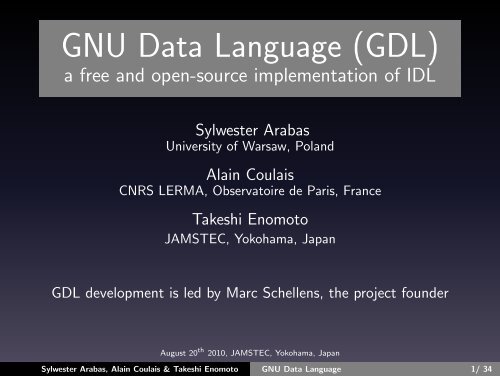
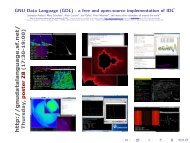

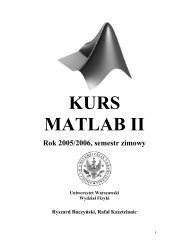
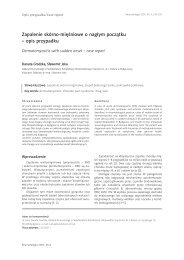
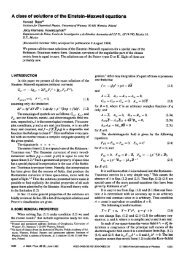
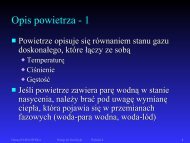
![slajdy [PDF, 0,6 MiB] - Instytut Geofizyki](https://img.yumpu.com/22546539/1/190x143/slajdy-pdf-06-mib-instytut-geofizyki.jpg?quality=85)
